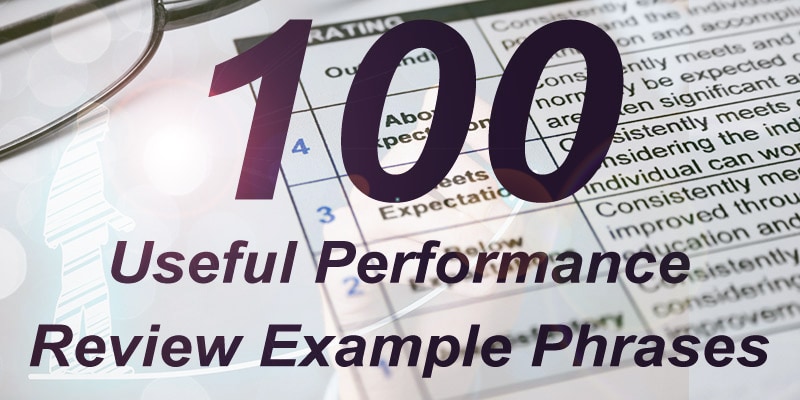It’s performance review season and you’re feeling under pressure. You have several staff members reporting to you and what with all the other priorities you have, finding the time to prepare, let alone strike the right balance between positive and negative feedback, is a challenge. If this scenario resonates with you, then this article is essential reading. We all know that performance reviews are an important part of employee engagement and help to raise productivity and employee performance across the board. However, as with most things in life, preparation is the essential starting point and so in this article, we share 100 useful performance review example phrases that you can adapt and customize to suit your team members. These performance review examples will help get you started and thinking about using language that is both professional and constructive.
Performance Reviews – The Basics
Before we get into the detail of actual performance review example phrases, let’s go over the basics of how to conduct successful reviews.
Be Positive And Honest
While it’s important to be as positive as possible, it’s also essential to be honest. If an employee is not performing in a particular aspect of their job then you must tell them so; however, be constructive and identify specific ways that they can turn things around. And make sure that you have a good balance of positives and negatives.
Two-way Communication
The performance review is the perfect opportunity for you to hear about each employee’s views on how things are going at a grassroots level. From the employee engagement perspective, it’s important that employees feel as though they are being listened to and their views matter. This is one way to demonstrate that and you may even discover a fresh insight or valuable new idea in the process.
Set Specific Achievable Goals
If you want to motivate your employees and give them something to aim towards, then you need to set specific goals that are realistic and achievable. Vague or unachievable goals will be counterproductive. In addition, make it clear how you as the manager and the organization as a whole can support the employee to achieve their personal development and career goals. It’s one important way to show that you are invested in their success as this is another key driver of employee engagement. You could, for example, use your employee intranet to track and achieve goals like this.
100 Performance Review Example Phrases
The examples listed here are designed to spark some ideas and get you thinking about how to approach performance reviews for your team members. The phrases are organized by the different skills, attributes and aspects of performance that are commonly covered in reviews. As we’ve seen, there will be employees that are meeting or exceeding expectations and some that are not. For each area, therefore, we have included positive statements as well as negative ones.
It’s important to remember, however, that these example phrases need to backed up with hard evidence and specific work examples if they are to be meaningful.
Achievements
- Improved overall productivity levels by x% or in the following key performance areas.
- Achieved or exceeded the goal [include specific goal] set in last year’s performance review by a margin of y%.
- Takes the initiative and is proactive in gathering information, assembling the tools or team members required to complete a project on time and to budget.
- Sets measurable goals for themselves and the team and regularly monitors performance.
- Provides strong evidence of achieving x,y or z specific task or accomplishment.
- Has not matched the performance of colleagues in relation to x,y,z productivity goal.
- Has fallen below the productivity target [include specific goal] set in last year’s performance review by x%.
Interpersonal Skills
- Works effectively within a team environment to achieve specific tasks or projects such as x,y,z.
- Develops constructive working relationships with internal and external stakeholders.
- Is an effective team player as demonstrated by their willingness to help out and contribute as required [specific examples would be helpful].
- Is proactive in sharing knowledge, skills and expertise with other team members.
- Could demonstrate more of a team focus by helping others achieve tasks to complete the overall project.
- Displays a tendency not to contribute in team or project meetings and doesn’t always participate in team activities or bonding exercises.
Attendance And Punctuality
- Is always punctual and is respectful of colleagues by arriving on time for meetings.
- Shows a willingness to go the extra mile during peak periods of work.
- Has an excellent attendance record of x% for the year.
- Has not met the required standards of punctuality and attendance.
- Sick leave and absence from work at x% are above the company average of y%.
Communication Skills
- Is an effective communicator as demonstrated by x,y and z.
- Displays the ability to communicate at all levels – up, down and across the business.
- Excels in developing lines of communication with external clients and stakeholders.
- Regularly contributes ideas and insights to team and project meetings.
- Needs to work on their written communication skills by doing x,y,z.
- Room for development of listening skills particularly in team meetings when different viewpoints are being expressed.
- Needs to display a greater willingness to participate in team and project meetings by contributing more ideas and insights.
Cooperation And Collaboration
- Is able to effectively collaborate with team and project members in order to complete a task.
- Shows a willingness to share ideas, best practice techniques and new ways of doing things.
- Is a team player and has a cooperative and harmonious disposition.
Has a tendency to work in isolation.
- Can be overly negative or critical in making contributions to team or project meetings.
- Fails to see the bigger picture beyond the team and department.
Productivity
- Regularly exceeds the productivity targets set at each appraisal and review checkpoint.
- Consistently delivers beyond expectations in all areas.
- Exceeds the company’s productivity expectations for the job role or project function.
- Makes an outstanding contribution to the team’s productivity levels.
- Has not met the required productivity standards set for the job role or project function.
- Is inconsistent in meeting the productivity targets set at the performance appraisal and review checkpoints.
Time Management And Administration
- Regularly meets all required team and project deadlines.
- Always comes prepared for meetings with an agenda and supporting papers. Takes the time to digest the information and comes to meetings ready to make contributions.
- Effectively chairs meetings so that everyone is encouraged to make a contribution, agendas are kept on schedule and a clear record of outcomes and actions is circulated on time.
- Has improved the organization’s administration by implementing x,y or z.
- Has devised better ways to achieve x, y or z functions or administrative support systems and avoid duplicate information.
- Needs to improve time management abilities so that projects and tasks are consistently delivered on time and if not, then the reasons why are effectively communicated at the earliest opportunity.
- More attention could be paid to time management of meetings and meeting preparedness.
- Could contribute more by looking for innovations and improved ways of carrying out administrative support functions.
Leadership And Delegation Skills
Understands the individual strengths of team members and is an effective motivator.
- Effectively delegates tasks to other team members with clear responsibilities and expectations.
- Displays a strong work ethic and sets an excellent example to others.
- Promotes a positive team environment that is reflective of the organization’s culture and values.
- Is willing to offer support and guidance to employees by [include examples].




 Has a tendency to work in isolation.
Has a tendency to work in isolation. Understands the individual strengths of team members and is an effective motivator.
Understands the individual strengths of team members and is an effective motivator.





The examples provided offer a great starting point for giving constructive and balanced feedback. It’s essential for managers to communicate effectively during performance reviews to foster growth and development in their teams. In the recruitment industry, particularly in areas like labourer jobs in Australia, clear and effective feedback is vital. Companies like RecruitWest can benefit from such resources to ensure their performance reviews are meaningful and contribute to the professional growth of their team members. This article is a valuable tool for any organization looking to enhance their review process. Thanks for compiling these helpful phrases!
This is such a helpful guide full of practical performance review phrases! I especially appreciate the balance between positive reinforcement and areas for improvement. While these phrases offer a solid starting point, enhancing the process with a tool like SogoEX could be transformative. By collecting regular feedback through survey tools, managers gain deeper insights into employee performance. This goes beyond ‘snapshot’ reviews to a more holistic picture. Has anyone integrated a platform like SogoEX with their review process? I’d love to hear how those insights shaped future appraisals.